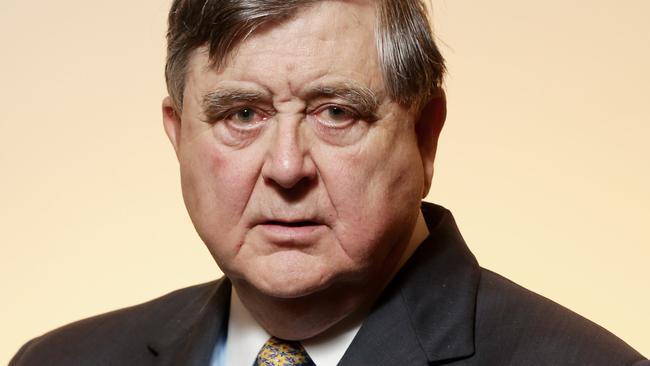David Irvine thrived in the complex world of security and diplomacy
David Irvine was once our man in Beijing, and he was perfectly qualified to chair the Foreign Investment Review Board in challenging times.

We will almost certainly never see it, but somewhere in a filing cabinet at the Rudd Street, Canberra, office of the Australian Secret Intelligence Service is a note to its then director-general instructing his organisation to bug the offices of East Timor’s government building in Dili.
The Intelligence Services Act dictates that ASIS is to “undertake such other activities as the responsible minister directs relating to the capabilities, intentions or activities of people or organisations outside Australia”.
The responsible minister was then minister for foreign affairs, Alexander Downer – who will have acted only with the approval of the National Security Committee of cabinet – and the ASIS boss was David Irvine. We will never know if Irvine resisted the request to spy on a friendly neighbour and had to be pulled into line. An intelligence community insider said that Irvine was “obliged to put his mind to it” – that is, consider the implications of the direction.
And those have been serious. At the time, Australia and East Timor – one of the region’s poorest nations – were in friction-filled negotiations over drilling rights in the waters of the Timor Gap estimated to be worth up to $50bn and the incident has damaged Australia’s reputation and its relationship with its neighbour. It has also led to the extraordinary legal action against an ASIS whistleblower known only as Witness K and his legal adviser, former ACT attorney-general and deputy chief minister Bernard Collaery.
But those who knew and worked with Irvine attest to the fact that he was always judicious and fair-minded in a long, varied career of challenging roles that included six years running ASIS until 2009 and, three days later, being appointed Director General of Security, putting him in charge of the Australian Security Intelligence Organisation for the next six years. He is the only person to have run both intelligence services, and across those years served four prime ministers: John Howard, Kevin Rudd, Julia Gillard and Tony Abbott.
His era coincided with a change of emphasis for Australia’s security community as we faced the growing threat of terrorism from religious extremists in the wake of the Bali bombings that killed 202 people, 88 of them Australian.
About the same time, the intelligence services started secretly investigating a then little-known Algerian migrant, Abdul Nacer Benbrika, monitoring and interpreting all calls on his 10 mobile phones under false names, uncovering his gang’s plans for a major terrorist attack, possibly at the MCG on the day of the 2005 AFL grand final.
Irvine had earlier served three years as ambassador to Papua New Guinea before moving to Beijing where he was jointly ambassador to China and the always unpredictably dangerous North Korea. It was a happier time in China-Australia relations and Irvine played a key role in securing the historic 2002 liquefied natural gas contract with China that is worth $25bn and runs until 2027, Australia’s largest export deal.
The stint in China and his security background made him uniquely qualified for the role he was given in 2017 by Scott Morrison, when he was treasurer, to chair the Foreign Investment Review Board. As Morrison said last week, Irvine was able to bring new perspectives to the job given the “changing geostrategic dynamics” of the Pacific region.
The always fastidious and fair Irvine confirmed the FIRB’s approval processes were non-discriminatory, but China wasn’t happy and included the FIRB among its “14 grievances” that led to it punishing Australia with sanctions that hit exports of wood, seafood, wine and coal. China’s excitable Foreign Ministry spokesman, Zhao Lijian, said: “We will not allow any country to reap benefits from doing business with China while groundlessly accusing and smearing China and undermining China’s core interests based on ideology.”
This was the complex world the shrewd, urbane and always humorous Irvine inhabited and which he untangled on our behalf. On news of his death, Morrison said: “David had a deep understanding of Australia and the region and the interconnection of diplomacy, security and economics.”
He also had a fascination with Indonesia, its culture, language and Java’s famous dalang puppet masters whose labyrinthine world matched his own.
David Taylor Irvine, diplomat and public servant. Born Perth, January 10, 1947. Died Canberra, March 30, age 75.




To join the conversation, please log in. Don't have an account? Register
Join the conversation, you are commenting as Logout